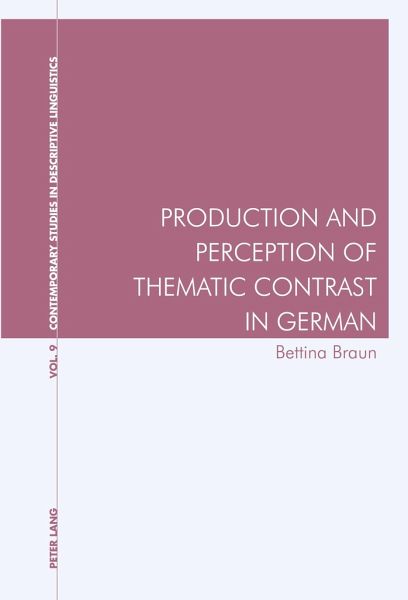
Production and Perception of Thematic Contrast in German
Versandkostenfrei!
Versandfertig in 6-10 Tagen
81,70 €
inkl. MwSt.

PAYBACK Punkte
0 °P sammeln!
Variations in speech melody (intonation) can be used to express different meanings (e.g. question vs. statement, friendliness). Yet, intonational information is hardly used in present-day linguistic models. When intonational information is used, it is mostly based on introspection rather than on empirical investigation; almost exclusively, a one-to-one relation between accent types and semantic function is assumed. This book focuses on an empirical investigation of thematic contrast in German. Thematic contrast has received considerable attention in semantics because sentences with contrastive...
Variations in speech melody (intonation) can be used to express different meanings (e.g. question vs. statement, friendliness). Yet, intonational information is hardly used in present-day linguistic models. When intonational information is used, it is mostly based on introspection rather than on empirical investigation; almost exclusively, a one-to-one relation between accent types and semantic function is assumed. This book focuses on an empirical investigation of thematic contrast in German. Thematic contrast has received considerable attention in semantics because sentences with contrastive themes can be used to imply propositions of various kinds without saying them explicitly.
In this book, first an acoustic comparison between sentences produced in contrastive and non-contrastive contexts is described. Intonational realisation is quantified in terms of the height and position of tonal targets. The perceptual reality of different productions and the relevance of different acoustic cues are tested by means of rating experiments. Finally, the data are prosodically annotated by a group of linguists to explore the validity and explanatory power of different accent categories for contrastive and non-contrastive themes in German.
In this book, first an acoustic comparison between sentences produced in contrastive and non-contrastive contexts is described. Intonational realisation is quantified in terms of the height and position of tonal targets. The perceptual reality of different productions and the relevance of different acoustic cues are tested by means of rating experiments. Finally, the data are prosodically annotated by a group of linguists to explore the validity and explanatory power of different accent categories for contrastive and non-contrastive themes in German.














